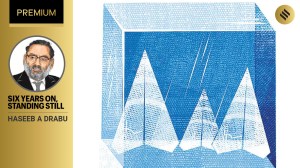Bombay HC seeks to know possibility of permitting only electric or CNG vehicles in Mumbai in future
The court also asked what approach should be taken to handle an “intense” air pollution problem and remarked that if the same is not properly dealt with, “we would continue to see haze and less or no visibility across the city”.
 Senior advocate Darius Khambata, Amicus Curiae, raised concerns over alarming air quality in Ulhasnagar in Thane and “massive smoke emissions” caused through bhattis in Chandivali area in Mumbai.
Senior advocate Darius Khambata, Amicus Curiae, raised concerns over alarming air quality in Ulhasnagar in Thane and “massive smoke emissions” caused through bhattis in Chandivali area in Mumbai.
Extreme air pollution in Mumbai cannot be controlled without “drastic measures”, the Bombay High Court said on Thursday and sought to know from lawyers and authorities whether there was any possibility of permitting only electric or CNG-based motor vehicles in the city in the future by phasing out diesel vehicles.
The court also asked the authorities and lawyers to deliberate on whether they can come up with the proposals that bhattis (furnaces or kilns) used for bakeries or for cooking food in small gatherings shall never be permitted to use wood or coal but run only on alternate fuels.
The court also asked what approach should be taken to handle an “intense” air pollution problem and remarked that if the same is not properly dealt with, “we would continue to see haze and less or low or no visibility across the city”.
A special bench of Chief Justice Devendra Kumar Upadhyaya and Justice Girish S Kulkarni was hearing a suo motu PIL and other pleas initiated and filed after noting various news reports, including the “Death by Breath” series by The Indian Express which presented an “alarming scenario” of air pollution, beginning in November 2023.
Senior advocate Darius Khambata, Amicus Curiae, raised concerns over alarming air quality in Ulhasnagar in Thane and “massive smoke emissions” caused through bhattis in Chandivali area in Mumbai.
CJ Upadhyaya orally remarked, “Bhattis are generally used by bakeries and for cooking food in small gatherings. As per newspapers, Mumbai produces 5 crore buns (paav). If these bhattis are run on coal or wood that may be a major source of pollution. Can we think of issuing a direction or can authorities come up with a proposal that no bhatti in the entire Mumbai used for bakeries or for cooking food shall ever be permitted to use wood or coal. They can all run very easily on gas.”
The judge added, “We somehow have a feeling that unless something drastic is done, the situation is not going to be controlled… as had been done in Delhi. We do not want to copy Delhi but still. Can we think of permitting plying of all motor vehicles, which are CNG driven, or electric vehicles, by phasing out diesel engine vehicles?”
Additional Government Pleader Jyoti Chavan informed the HC that the Maharashtra Pollution Control Board (MPCB) recently issued preliminary show-cause notices to 287 bakeries, including Yazdani bakery in Fort area of South Mumbai. She added that bakeries have been given time to use green/cleaner fuels, including electricity or PNG, and closures can be initiated if they do not comply with the norms.
Senior advocate Milind Sathe, representing the Brihanmumbai Municipal Corporation (BMC), submitted that it has asked all the bakeries to convert to green fuel and to ensure complete transition. The BMC has been taking mitigating measures in case of pollution through big infrastructure projects, he added.
Senior advocate Janak Dwarkadas, representing an intervenor in the matter, suggested that devices can be fixed providing real time display of pollution levels outside construction sites in the city and authorities accessing the data can take immediate action against errants. The court asked authorities to consider the same.
Justice Kulkarni then asked what could be done during “extreme situations”. “All these times, particularly after Diwali, there are firecrackers, smog and we do not know what all Mumbaikars were breathing. Causes of pollution are broadly known. What should be the approach for authorities to handle this extreme or intense situation or we continue to see this haze and low or no visibility across the city and everywhere in the suburbs,” the judge orally remarked.
Justice Kulkarni also said that while HC had passed orders restricting burning of firecrackers between 8 pm to 10 pm, the same was not implemented. “We could see firecrackers burst up to 1o’clock at night… implementing agencies are absolutely not working,” Justice Kulkarni said, adding that despite court orders, long stretches of traffic jams were adding to the pollution as efforts by authorities were insufficient.
The court said that actions by the BMC and authorities “have not abated the situation between November to January” and they require to take “more drastic measures”.
The court also queried Advocate General Birendra Saraf representing the state as to why MPCB conducted an audit of only 1,000 red category (highly polluting) industries out of over 7,000 industries so far and why nearly 1,000 posts at MPCB were not sanctioned despite repeated orders.












